Bachelor's Degree in Audiovisual Communication

Our numbers speak for themselves
In direct contact with the profession from the beginning
Reasons to study
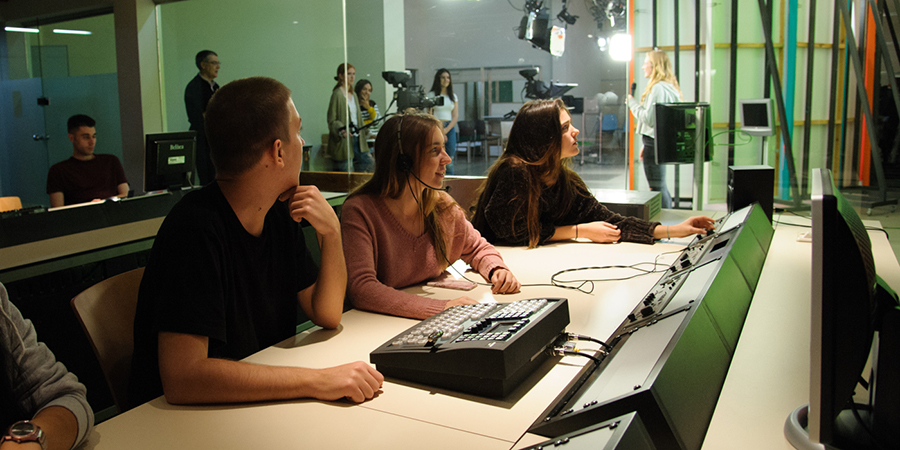
A technical-artistic career
We teach you the technical knowledge, but you will also learn about storytelling and the entire communication process.

New career opportunities
Discover all the career opportunities within the world of audiovisual communication.
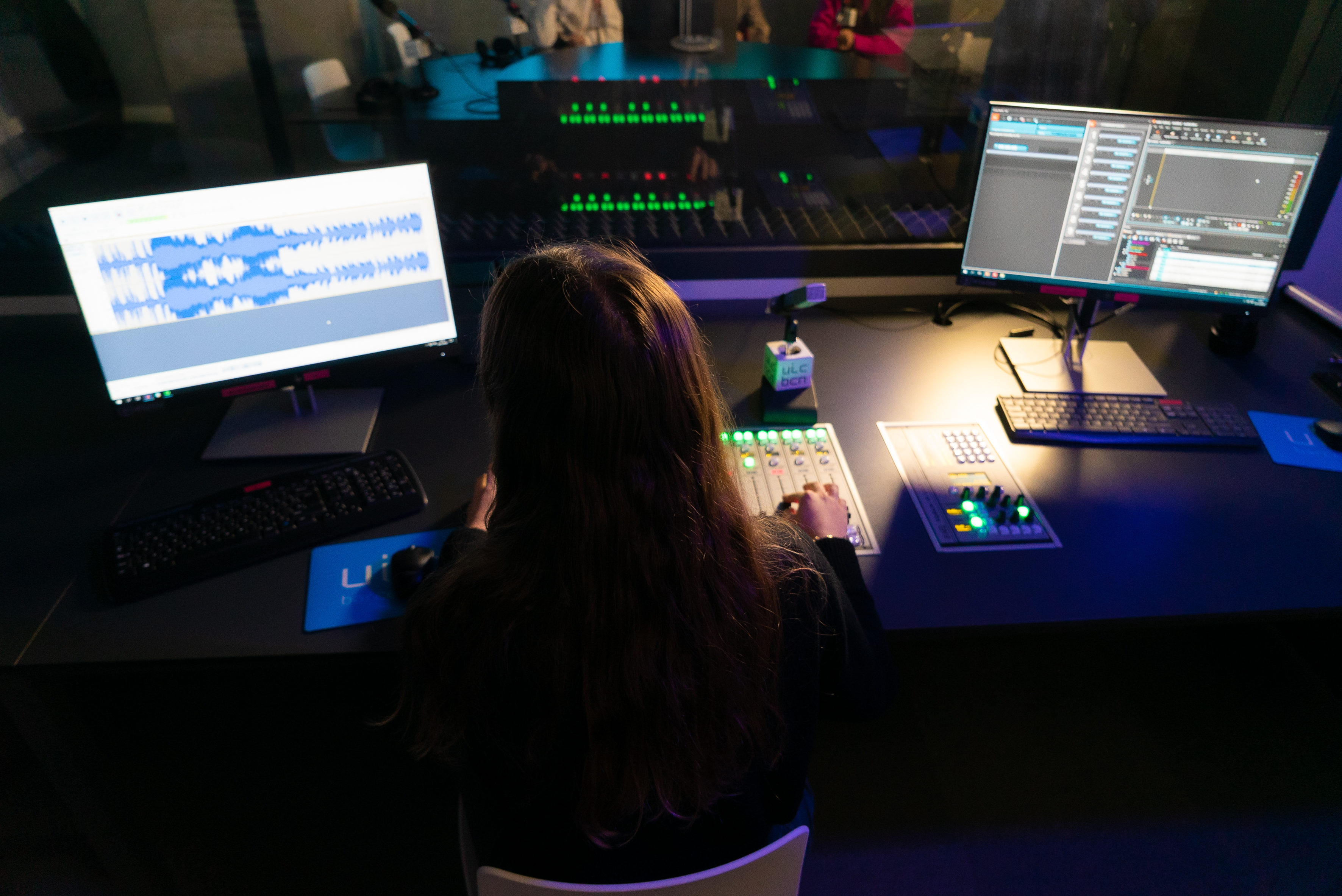
Practical learning
A curriculum especially designed to acquire practical knowledge. State-of-the-art materials and facilities at your disposal from the first day.
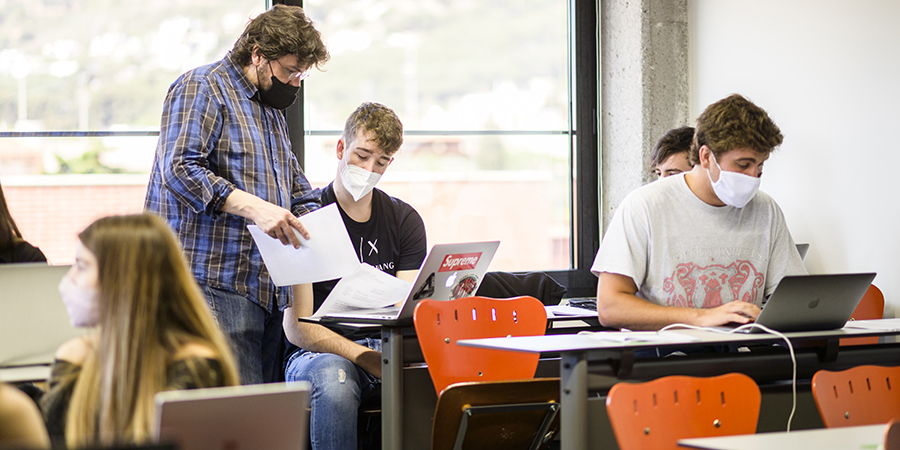
Friendly, individual attention
We are committed to you: we want to be your partner throughout your degree programme. For this reason, we are always available to provide friendly, personal support and guidance.
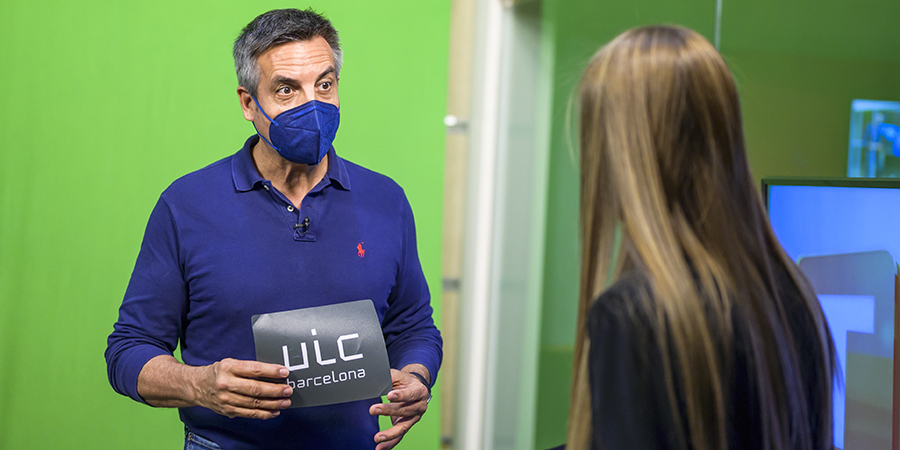
High quality teachers
Our teaching staff includes doctors, researchers and renowned professionals currently working in the industry.
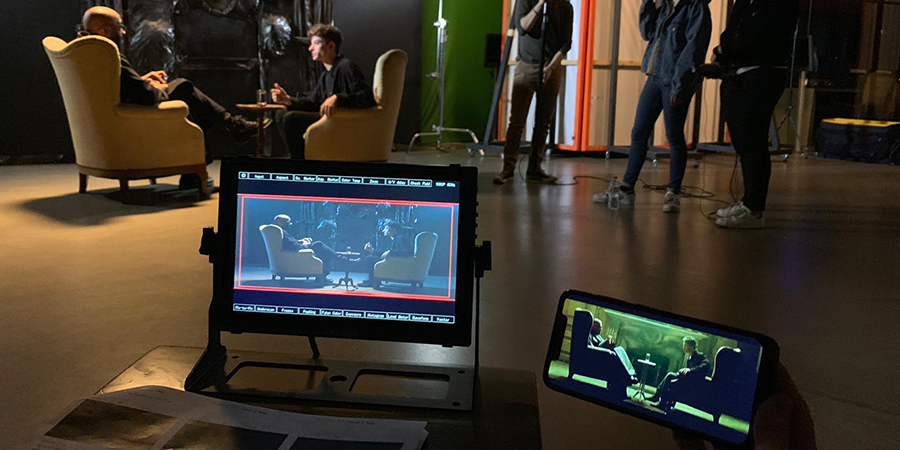
Activities
Enjoy learning at especially organised conferences like the TV Fiction Symposium , the International Short Film Award and Filmmaking
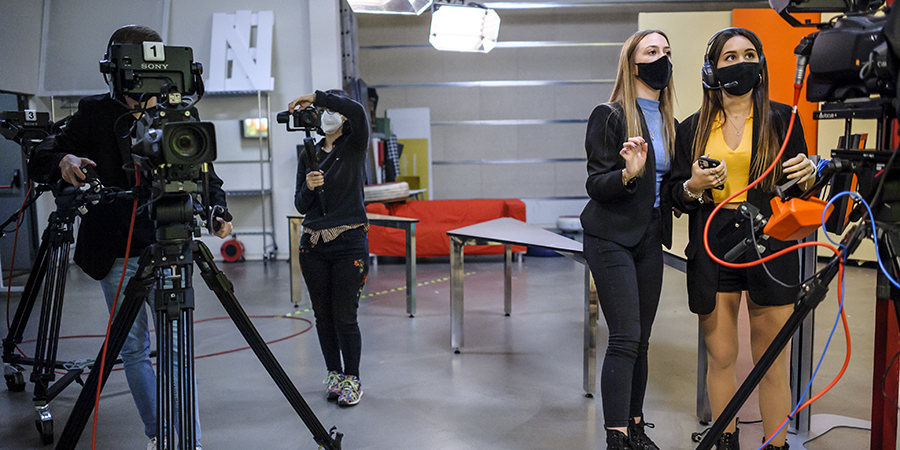
World class facilities
You will have access to Digital Media Studios, to Transmedia Lab and material from the beginning that you can also use for your personal projects.
Prepare for more job opportunities
At UIC Barcelona, we teach you the skills necessary to successfully adapt to the job market.
- Film: director, producer, screenwriter, film maker, manager, documentary maker, etc.
- TV: director, producer, film maker, screenwriter, writer, reporter, etc.
- Radio: director, writer, producer, etc.
- Press and specialised magazines: section head, writer, content manager, etc.
- Internet, websites and multimedia
- Advertising and design agencies
- News agencies
- Coolhunting or trend-watching
- Communication departments and offices for businesses, public relations and corporate communication
- Communication consultants for institutions and large corporations
- Teaching: upper secondary level education and research
- Content producers
- ENG Professional
- Communication for fashion and trends
Students explain their experience
"I want to dedicate myself to filmmaking and that's why I study Audiovisual Communication. In the first year we have done practices, some of them focused on cinema, in which I learned a lot. I love teachers, they all come to work with passion and are always there for whatever we need. They give us opportunities to do internships outside the university and they mentalize us, from day one, to work as if we were in a professional environment.
It also offers a wide variety of courses and activities: public speaking, sports, theater ... In my case I have chosen creative writing and filmmaking, because I am more focused on what I want to do. Both are helping me a lot to improve my skills in writing, telling stories, how to focus them or how to give them life behind a camera.
In a few words, I consider myself very lucky, and I am excited to see what new challenges I will have to face in the next three years.”
Camila Fernández-Cruz Romero
Bachelor's Degree in Audiovisual Communication
“Studying audiovisual communication at UIC Barcelona has allowed me to acquire knowledge in many different subjects and sectors from different industries. I’ve learned to think critically about the audiovisual content I consume each day and most importantly, discover who I am and unearth my personality as an author.
I’ve not only grown as an individual but as an artist, too!
UIC Barcelona has opened up a lot of doors for me. I came from Andorra to do the bachelor’s degree in Barcelona, I went on an Erasmus year to Southampton in the United Kingdom and when I finish my degree, I want to go to California (United States) to do a postgraduate degree.”
Jane-Claudine Cantor Durán
Bachelor's Degree in Audiovisual Communication
Professors and lecturers with long experience in the communication sector
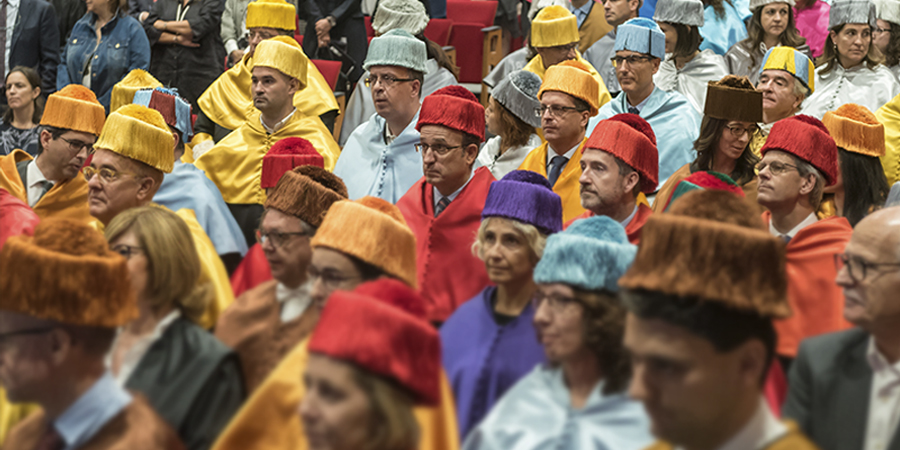
The Faculty’s teaching body consists of lecturers and professors who are also active in the private sector and who have long experience in the audiovisual, journalism and advertising sectors. The teaching staff are all in direct contact with the daily reality of this profession, since they combine their executive roles in the media with teaching in the Faculty. This allows students to achieve an education that is at the cutting-edge of the sector, that facilitates work placements and allows for greater labour insertion. Also, the teaching staff have extensive research experience at both a national and international level acquired through visits to and exchanges with other universities.
With this degree, you can study part of the curriculum or do your internship abroad, with academic recognition
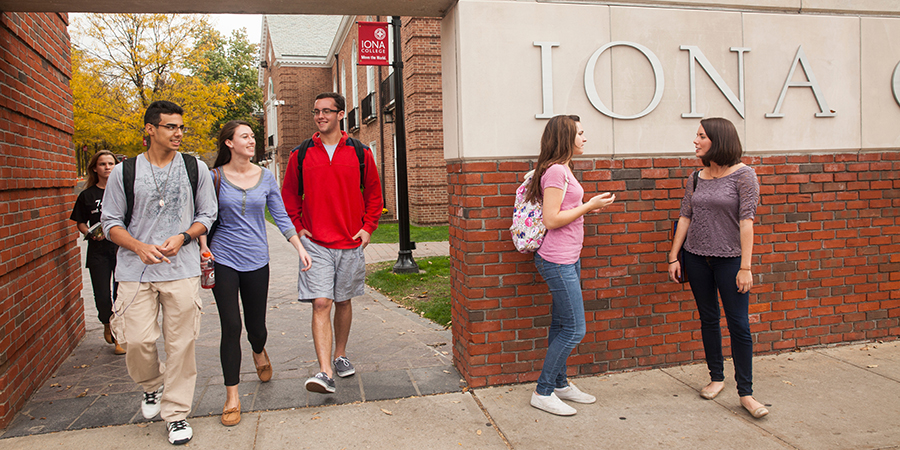
Participate during one semester or year at one of your faculty's partner universities, or search for a business abroad for your internship.
Get part of your ECTS during the summer at the Berkeley Summer Sessions, the best public university in the world, or achieve an international double degree at IONA College (Nova York).
Additional information
Presentation
On the Bachelor's Degree in Audiovisual Communication, we give students the skills they need to become versatile and dedicated professionals, capable of generating, managing and producing high-quality audiovisual content, whilst adhering to professional ethics and fulfilling their social responsibility. One of the Faculty’s main objectives is to offer completely personalised, future-focused training that reflects the current audiovisual communication context.
This bachelor’s degree is aimed at anyone looking to work in the audiovisual sector as a director, scriptwriter, editor, producer, filmmaker or camera operator, among other roles. Skills such as how to write a film script, how to produce a television programme or shoot and edit a short film are just some of the techniques we study with a view to giving every student the expertise they need to access the audiovisual job market.
In order to fulfil the proposed goals, our team of lecturers, made up of academics dedicated to teaching and research, as well as professionals from the world of audiovisual communication, offer students their wealth of knowledge essential for succeeding in this profession. Additionally, the degree's curriculum includes subjects in English that are suited to each programme, which aim to give students a more international outlook.
We also offer students the chance to complete a work experience placement in leading audiovisual companies such as RTVE, El Terrat Produccions, TV3, Telecinco, Onda Cero, Radio Marca, and more. On-the-ground experience is the best way to acquire professional skills.
What’s more, as UIC Barcelona is adapted to the Bologna Process, graduates are also able to work as communication professionals in the European Higher Education Area (EHEA).
Objectives
The main objectives of the Bachelor's Degree in Audiovisual Communication are to:
- Train professionals capable of generating, managing and producing high-quality audiovisual content, whilst adhering to professional ethics on all occasions.
- Nurture communication skills, creativity and technical expertise.
- Help students master written and audiovisual languages, new technologies and other tools used in the sector.
- Facilitate knowledge about the audiovisual world and all stages of the production cycle.
- Provide students with a multicultural and international outlook.
- Facilitate knowledge on the evolution of different film, radio and television genres with the aim of generating novel formulas for the market.
- Encourage an entrepreneurial spirit, self-learning and vocational responsibility.
- Develop teamwork and leadership skills.
Who is it aimed at? Prospective students
Anyone who fulfils the admission requirements and general prerequisites for accessing the degree programme may apply. The majority of our students come from the humanities or social sciences, but the bachelor’s degree is open to students from any academic background.
This programme is aimed at anyone who’s passionate about audiovisual communication and wants to work in the sector. We're looking for motivated students who are eager to learn and innovate; creative people who want to design and create audiovisual content, with a critical, analytical and entrepreneurial eye; who know how to work in a team; students that are engaged in what’s going on in the world today and who want to grow as professional communication experts.
Competences. Graduate profile
Competences
Students will acquire a range of skills that will equip them for a successful career in today’s world of communication.
Graduate profile
The graduate profiles for this bachelor’s degree are:
- Director: film, television, video, advertising, radio, computer graphics and multimedia.
- Scriptwriter: film, television, video, advertising, radio, computer graphics and multimedia. See example (link)
- Editor/reporter: film, television, video, advertising, radio, computer graphics and multimedia.
- Audiovisual producer and content manager
- Production design and post-production visuals and sound
- Researcher, teacher and expert in visual studies
Recommended videos:
Directing film by Juan Antonio Bayona
The success of Polseres vermelles (The Red Band Society), explained by its director, Pau Freixes:
Academic accreditation
Graduado o Graduada en Comunicación Audiovisual por la Universitat Internacional de Catalunya.
What’s more, as UIC Barcelona is adapted to the Bologna Process, graduates are also able to work as communication professionals in the European Higher Education Area (EHEA).
Academic structure
- Communication (24 ECTS)
Written communication, Audiovisual narratives 1, Persuasive communication, Radio, 0 Courses. - The information and knowledge society (48 ECTS)
Structure of the Audiovisual System, Sociology, History, Cultural Foundations of Communication, Law and Economics, Information Theory, Communication Theory, Publicity and Public Relations. - Audiovisual creation (30 ECTS)
Audiovisual production, Audio and video editing, Graphics, Audiovisual creation workshop, Post-production and editing, Audiovisual narratives 2, Sound in audiovisual productions, Applied music. - English (32 ECTS)
Effective speaking skills, English for academic purposes, Professional English for audiovisual communication. - Contents and platforms (28 ECTS)
Techniques for communication by genre; Design, distribution and audiovisual diffusion; Final project; Professional practicum. - Global trends (20 ECTS)
History of film and television, Sociology 2, Economics, Law, Trends in modern thought, Aesthetics. - Audiences (20 ECTS)
Psychology, the audiovisual market, Ethics, Audiovisual platforms, Programming strategies, Audience analysis. - Filmmaking* (38 ECTS)
Directing films, Audiovisual production, Photographic direction, Artistic direction, Sound and music in audiovisual productions, Post-production and editing, Screenwriting workshop, Producing and shooting television series, Film criticism and analysis, Film genres, Documentaries. - Television and radio* (38 ECTS)
Television shoots, Television production, Audiovisual sound techniques, Post-production, Editing theory and practice, Programming and directing contents, Producing and shooting television series, Television criticism and analysis, Television genres, New formats, Documentaries.
* Course participants choose one of the following modules: Filmmaking (FM) or Television and Radio (TR).
Teachers
- ARREBOLA CONCEJERO, Daniel
- ARRIBAS PIQUÉ, Andreu Maria
- BAKER, Martyn Russell
- BANQUÉ SALDAÑA, José María
- BORRÀS RÁFALES, Marc
- BUHIGAS CARDÓ, Pere
- BUIL GAZOL, Pilar
- CABALLERO SARDÀ, Teresa
- CALVO CAMPOS, Eloy
- CASTILLO HINOJOSA, Ana María
- CLAVELL CORBERA, Ferran
- CÓRDOVA MARTÍNEZ, Suzanne
- COWPER SAL.LARI, Geoffrey
- DEL CACHO RIVERA, José Ignacio
- DE SANTIAGO BAYONA, Andreu
- DIESTE GARCIA, Marina
- DOMINGO DOMINGO, Mª Lourdes
- ESCURRIOLA PEÑA, Anna
- FAURE CARVALLO, Adrien
- FERNÁNDEZ MORENO, Ana Aitana
- FITÓ CARRERAS, Maria
- GARCÍA AVIS, Isadora
- GARCIA COLLADO, Francisco Jose
- GARCÍA DE ORO, Luis
- GRÀCIA MERCADÉ, Carla
- GRIMA GUALLART, Javier
- HERNANDEZ SERRET, Joan
- JUSTEL VÁZQUEZ, Santiago
- KNIGHT, Janine Gwendolyn
- KOVACSICS GRISOLIA, Violeta
- LACASA MAS, Iván
- LLOBET BARRACHINA, Marc
- LLOPIS MATÉ, Maria Teresa
- LOOSSENS, Rudi Irma Karel
- MARTINEZ VILLARES, Jordi
- MÉNDIZ NOGUERO, Alfonso
- MÉNDIZ NOGUERO, Arturo
- MIÑANA PLANCHART, Alexandre
- MONTUENGA RÍOS, Rocío
- MOYA RUIZ, Albert
- NARBERHAUS MARTINEZ, Marta
- NEBRERA GONZÁLEZ, Montserrat
- NEIRA BORRAJO, Elena
- OLIVA FERNÁNDEZ, Silvia
- ORTEGA DURAN, Mireia
- PETRUS PONS, Ana Maria
- PINELL PLIUS, Maria
- PUIGDOMÈNECH LÓPEZ, Jorge Francisco
- RIGALL COROMINAS, Montserrat
- ROBERT AGELL, Francesc
- ROCA TRENCHS, Nuria Candela
- RUIZ VICENTE, Micaela
- SÁEZ SÁNCHEZ, Javier
- SALVAT BENLLOCH, Marta
- SÁNCHEZ COSTA, Fernando
- SÁNCHEZ GIMÉNEZ, Patricio
- SORRIBAS FIERRO, Mario
- STANGER, Doris
- UGARTE ORTIZ DE LANZAGORTA, Jose Luis
- VIDAL MESTRE, Montserrat
- VILLANUEVA BENITO, Isabel
- VINCZE, Laura
Internship
Work placement
UIC Barcelona holds agreements with a variety of national and international companies in the audiovisual sector. Among them are:
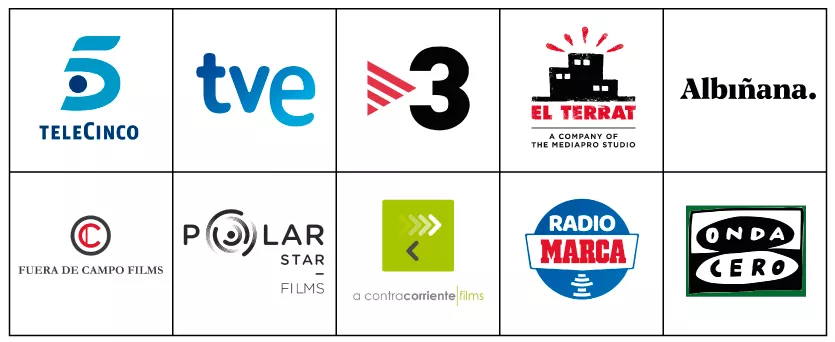
Objectives
The main objective of the work placement is for students to come into contact with the professional world of journalism and to acquire the skills they need to successfully adapt to the job market. It is also the ideal environment in which to apply the concepts they have about learned in the classroom.
At UIC Barcelona, we connect with the student's professional future by providing them with a wide range of organisations in the sector where they can undertake their work placement. We also monitor students individually to ensure that they are meeting their goals such as the tasks to be carried out, learning and knowledge and skills acquisition.
All updated information regarding the specific functioning and regulations of the work placement can be found in each degree programme’s Course Guide.
Professional opportunities
- Film: director, producer, writer, manager, researcher, etc.
- Television: director, producer, writer, copy writer, etc.
- Radio: director, writer, producer, etc.
- Press and specialised publications: department chief, writer, content manager, etc.
- Internet, web pages, and multimedia.
- Publicity and design agencies.
- News agencies.
- Coolhunting.
- In-house departments of communications, public relations, and corporate communication.
- Communication consultants at institutions and large corporations.
- Institutions of higher education and research centres.
- Content producers.
- ENG professionals.
- Communication in the fashion and style sector.
Prerequisites & admissions
Application for admissions
To pre-register for undergraduate studies at UIC Barcelona, you will need to complete the application form available at the following link:
Entrance Examinations
The entrance exam is held several times throughout the year on the Campus Barcelona. To take the exam, you must first complete the application for admission.
For more information:
Required documentation
The documentation required for the admission process varies according to each candidate’s academic background. Click on the following link to see what documents you will need to provide:
Reservation and enrolment
In order to reserve a place on the programme, admitted candidates must pay 20% of the first year fee upon receiving their letter of acceptance.
The remaining 80% is due after enrolment.
For more information:
Acces routes
Programme applicants may come to UIC Barcelona from different academic backgrounds. Click on the following link for detailed information on the route most pertinent to you:
Grants & financial aid
Grants
UIC Barcelona offers various fellowships supported by both public institutes (MEC or AGUAR) as well as private UIC Barcelona funds.
For further information, please check with our admissions department:
Financial aid
Each payment method is adhered to the specific financing conditions of each degree programme.
Please see the attached document for details on these conditions:
Discounts
Those seeking undergraduate degrees at UIC Barcelona may be eligible for different discounts depending on their circumstances.
Faqs
International mobility
Study abroad temporarily
As a student in this degree programme, you may complete part of your degree or a work experience placement abroad and receive academic recognition.
Spend a semester or a full academic year at one of your Faculty’s partner universities or find a company abroad to do an internship. You may also:
- Berkeley Summer Sessions, the world’s best public university; or
- Obtain an international double degree at IONA College (New York).
- Participate in the SICUE mobility programme (in Spain)
For information about everything you need to do before, during and after your mobility stay, check out the "Study abroad" section and download all the documentation specific to your Faculty:
Study with us
Study with us temporarily
If you are studying at another Spanish or foreign university, you can come to UIC Barcelona to study temporarily for one semester or a full academic year.
Visit the international exchange students site for more information and, download here all the specific documentation of this faculty:




